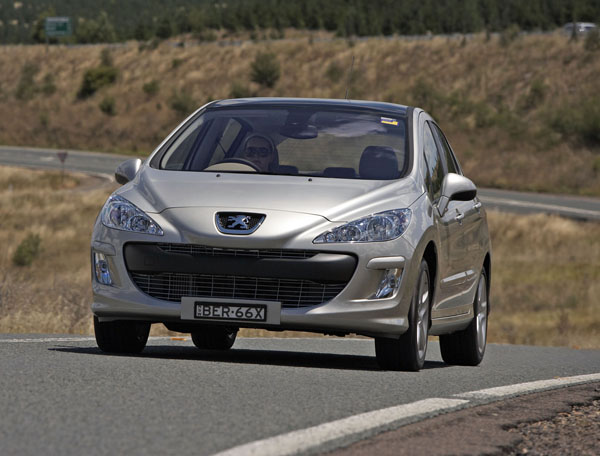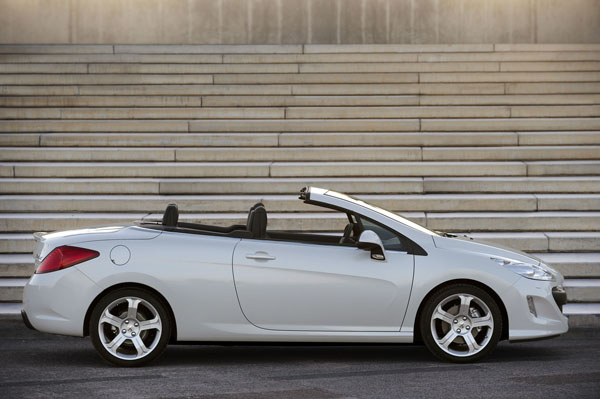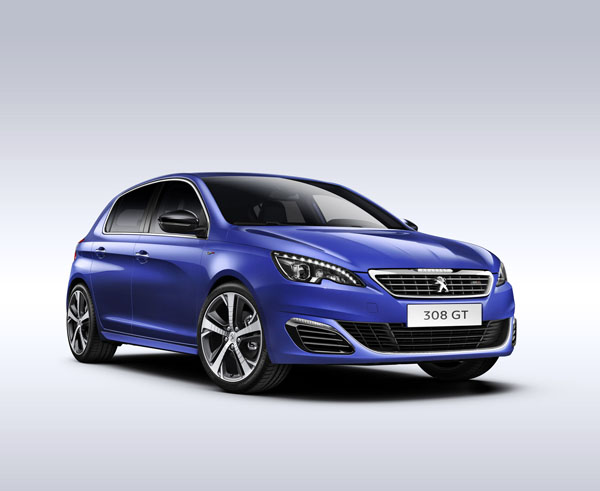
Peugeot 308 is a small-medium French car that’s well regarded for style and comfort. It has never reached the sales heights of the likes of models in its class from Hyundai, Mazda and Toyota and so on. But those who like driving something out of the ordinary should put a Peugeot 308 somewhere on their short list.
Despite its styling flair the 308‘s designers hadn’t forgotten about function, it has a good-sized rear seat for its class, and sensible luggage space. Indeed, European owners regard cars in the Peugeot 308 class as family transport. In Australia they tend to be bought by singles or those with preteen kids.
The aforementioned comments refer to the five-door hatchback and station wagon. Obviously the 308 CC (convertible coupe) with its folding hardtop is obviously not as spacious in the rear seat. Then again we’ve seen more than one Aussie 308 CC with smiling little faces in the back.
Peugeot 308 replaced Peugeot 307 in February 2008. It was an improvement on the 307 in driving enjoyment as Peugeot enthusiasts had been critical of the 307 handling almost from day one. Push it hard and the first generation 308 isn’t too keen on what was happening to it, however it will keep you out of trouble.
The original 308s came with a choice between a pair of turbo-diesels, with capacities of 1.6 and 2.0 litres, producing 88 and 100 kilowatts respectively. More importantly, they manage top torque figures of 240 and 320 Nm. Peugeot has had a strong push on diesels downunder for many years and the older oil burners are well regarded.
There was also a pair of 1.6-litre petrol engines designed in partnership with BMW. One is a turbo unit (designed in conjunction with BMW) with 110 kW, and 240 Nm at a very low 1400 rpm, so there’s no shortage of urge. The other is a non-turbo with 88 kW. No marks for guessing which we prefer!
The latest generation Peugeot 308, launched in Australia in October 2014 was a blank-screen development and answered all the complaints about the model it replaced. It had an all-new platform that made it lighter than the outgoing model by as much as 140 kilograms.
Even more importantly it well and truly returned to the comfort and chassis dynamics of the Peugeots of the past. The gen-two 308 is lower and sleeker than the model it replace, yet clever design means it has retained the same cabin space.
New Peugeot 308 is offered as a five-door hatch and five-door Touring wagon. New engines were developed, the most interesting being a 1.2-litre, three-cylinder, turbo-petrol unit producing 96 kW of power. A turbo-diesel displacing 2.0 litres is a four-cylinder and puts out 110 kW. Six-speed manual and automatic transmissions sit beside each of the engines.
Additional models arrived early in 2015. The most exciting is the 308 GT with 150 kW four-cylinder turbo-petrol and 133 kW turbo-diesel engines, lowered sports suspension and uprated body styling.
Peugeot has been established in Australia for close to seven decades and dealers have a firm foothold in many areas, including in the bush where the car still brings back memories of the gruelling Trials of the 1950s.
Spare parts are priced higher than for typical Asian models in this car class, but not outrageously so. We have heard no real complaints about availability.
This Pug is not the sort of car you can work on yourself if you want to do more than basic maintenance.
Insurance tends to be moderate in price with the GT, which really isn’t a hot-shot model, seldom being penalised for added performance.
WHAT TO LOOK FOR
Peugeot 308s are generally well built, though not the standard of Asian cars. A professional inspection is a must, but by all means carry out your own checks to the best of your knowledge.
The interior should be neat and tidy with nothing coming loose, or making noises on bumpy roads during our testing.
Older turbo-diesels may be slow to fire up, but if this is too bad have a qualified mechanic check it out.
Turbo-petrol engine engines fire up faster than the turbo-diesel, but see the above note about a professional check.
A manual gearbox should be smooth in operation. If it’s getting on in years and/or kilometres it may be slow and noisy on downchanges, third to second is usually the first to go.
Look for signs of crash repairs, such as mismatched paint, ripples in the panels when viewed along their length, and tiny spots of paint on glass, badges and similar unpainted areas.
CAR BUYING TIP
When inspecting a car pay as much attention to state of its interior you do the external bodywork.











